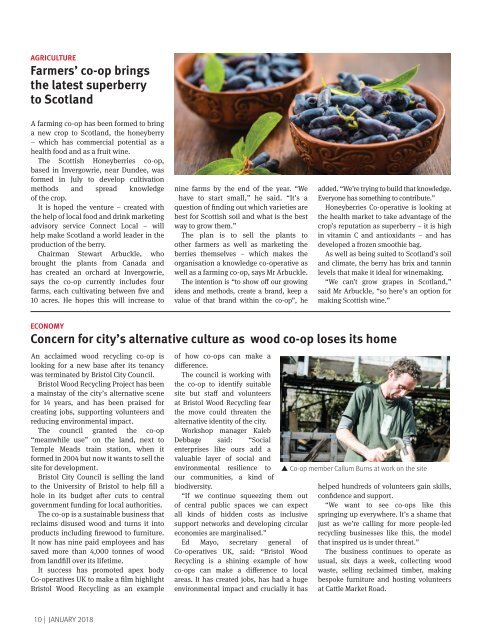JANUARY 2018
The January edition of Co-op News: connecting, challenging and championing the global co-operative movement. This issue explores finding the route to collective decision-making. It also looks at gender equality, co-housing for homeless veterans and what 2018 holds in store.
The January edition of Co-op News: connecting, challenging and championing the global co-operative movement. This issue explores finding the route to collective decision-making. It also looks at gender equality, co-housing for homeless veterans and what 2018 holds in store.
You also want an ePaper? Increase the reach of your titles
YUMPU automatically turns print PDFs into web optimized ePapers that Google loves.
AGRICULTURE<br />
Farmers’ co-op brings<br />
the latest superberry<br />
to Scotland<br />
A farming co-op has been formed to bring<br />
a new crop to Scotland, the honeyberry<br />
– which has commercial potential as a<br />
health food and as a fruit wine.<br />
The Scottish Honeyberries co-op,<br />
based in Invergowrie, near Dundee, was<br />
formed in July to develop cultivation<br />
methods and spread knowledge<br />
of the crop.<br />
It is hoped the venture – created with<br />
the help of local food and drink marketing<br />
advisory service Connect Local – will<br />
help make Scotland a world leader in the<br />
production of the berry.<br />
Chairman Stewart Arbuckle, who<br />
brought the plants from Canada and<br />
has created an orchard at Invergowrie,<br />
says the co-op currently includes four<br />
farms, each cultivating between five and<br />
10 acres. He hopes this will increase to<br />
nine farms by the end of the year. “We<br />
have to start small,” he said. “It’s a<br />
question of finding out which varieties are<br />
best for Scottish soil and what is the best<br />
way to grow them.”<br />
The plan is to sell the plants to<br />
other farmers as well as marketing the<br />
berries themselves – which makes the<br />
organisation a knowledge co-operative as<br />
well as a farming co-op, says Mr Arbuckle.<br />
The intention is “to show off our growing<br />
ideas and methods, create a brand, keep a<br />
value of that brand within the co-op”, he<br />
added. “We’re trying to build that knowledge.<br />
Everyone has something to contribute.”<br />
Honeyberries Co-operative is looking at<br />
the health market to take advantage of the<br />
crop’s reputation as superberry – it is high<br />
in vitamin C and antioxidants – and has<br />
developed a frozen smoothie bag.<br />
As well as being suited to Scotland’s soil<br />
and climate, the berry has brix and tannin<br />
levels that make it ideal for winemaking.<br />
“We can’t grow grapes in Scotland,”<br />
said Mr Arbuckle, “so here’s an option for<br />
making Scottish wine.”<br />
ECONOMY<br />
Concern for city’s alternative culture as wood co-op loses its home<br />
An acclaimed wood recycling co-op is<br />
looking for a new base after its tenancy<br />
was terminated by Bristol City Council.<br />
Bristol Wood Recycling Project has been<br />
a mainstay of the city’s alternative scene<br />
for 14 years, and has been praised for<br />
creating jobs, supporting volunteers and<br />
reducing environmental impact.<br />
The council granted the co-op<br />
“meanwhile use” on the land, next to<br />
Temple Meads train station, when it<br />
formed in 2004 but now it wants to sell the<br />
site for development.<br />
Bristol City Council is selling the land<br />
to the University of Bristol to help fill a<br />
hole in its budget after cuts to central<br />
government funding for local authorities.<br />
The co-op is a sustainable business that<br />
reclaims disused wood and turns it into<br />
products including firewood to furniture.<br />
It now has nine paid employees and has<br />
saved more than 4,000 tonnes of wood<br />
from landfill over its lifetime.<br />
It success has promoted apex body<br />
Co-operatives UK to make a film highlight<br />
Bristol Wood Recycling as an example<br />
of how co-ops can make a<br />
difference.<br />
The council is working with<br />
the co-op to identify suitable<br />
site but staff and volunteers<br />
at Bristol Wood Recycling fear<br />
the move could threaten the<br />
alternative identity of the city.<br />
Workshop manager Kaleb<br />
Debbage said: “Social<br />
enterprises like ours add a<br />
valuable layer of social and<br />
environmental resilience to<br />
our communities, a kind of<br />
biodiversity.<br />
“If we continue squeezing them out<br />
of central public spaces we can expect<br />
all kinds of hidden costs as inclusive<br />
support networks and developing circular<br />
economies are marginalised.”<br />
Ed Mayo, secretary general of<br />
Co-operatives UK, said: “Bristol Wood<br />
Recycling is a shining example of how<br />
co-ops can make a difference to local<br />
areas. It has created jobs, has had a huge<br />
environmental impact and crucially it has<br />
p Co-op member Callum Burns at work on the site<br />
helped hundreds of volunteers gain skills,<br />
confidence and support.<br />
“We want to see co-ops like this<br />
springing up everywhere. It’s a shame that<br />
just as we’re calling for more people-led<br />
recycling businesses like this, the model<br />
that inspired us is under threat.”<br />
The business continues to operate as<br />
usual, six days a week, collecting wood<br />
waste, selling reclaimed timber, making<br />
bespoke furniture and hosting volunteers<br />
at Cattle Market Road.<br />
10 | <strong>JANUARY</strong> <strong>2018</strong>


















